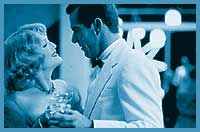Far From Heaven reaffirms Todd Haynes as the most fascinating filmmaker of contemporary American cinema. There is little doubt that this is one of the best films you will see this year. The question is: Are you going to enjoy it?
For formal inspiration, Haynes turns to the master of 1950s melodrama Douglas Sirk. While the melodrama was (and is) much maligned and mocked, Sirk’s films are celebrated – after the fact, mind you – as intelligent, withering critiques of US social structures, particularly the way they make life miserable by proscribing behaviour along gender and class lines.
Haynes lifts tropes, storylines and even props from Sirk to create his own critique of American mores. The result is a kind of retro-update – a film that walks and talks like a bona fide “women’s weepy,” but whose social concerns are those of today.
Julianne Moore (who won a best actor prize at the Venice film festival for this role) plays suburban Connecticut wife and mother Cathy Whitaker who, at the film’s outset, is concerned with little else than hosting the perfect cocktail party for her executive husband Frank (Dennis Quaid in a brilliant turn). But everything goes all to hell when Cathy discovers Frank “working late” at the office, locked in the embrace of another man.
As her world crumbles around her, Cathy finds solace in friendship with her gentle and gentlemanly gardener Raymond (Dennis Haysbert). But Raymond is black, and the friends soon find that the hint of miscegenation – not to mention the crossing of class lines – brings about social pressures that they are not prepared to handle.
Finally, Far From Heaven is about these pressures and the ways they make many people sad and lonely, unable to reach out for what they want as they sacrifice their desires to the greater good of perceived social stability.
As melodrama, the film is absolutely, uncannily airtight: Place it next to Sirk’s masterpiece, All That Heaven Allows, and – gay and race content aside – you’d think the two films were made within weeks of each other. Costumes, colours, the sometimes wooden delivery by the actors – it’s all exactly as it should be. But there lies the problem: It’s such a perfect imitation of the genre that if you don’t like melodrama, Far From Heaven may not be your cup of tea.
But if you do, bring lots of Kleenex – you’re in for a treat.
Inside Out and Images presents a special advanced screening on Mon, Nov 4 at the Paramount (259 Richmond St W); reception at 6pm, screening at 7:30pm. Tix are $15; call (416) 977-6847 or (416) 971-8405.
Far From Heaven opens Fri, Nov 8.

 Why you can trust Xtra
Why you can trust Xtra


